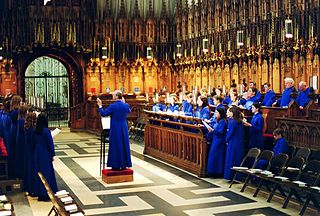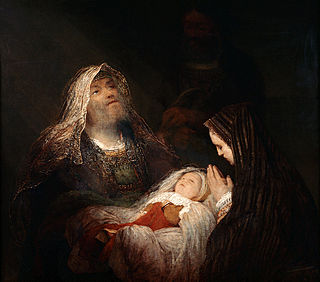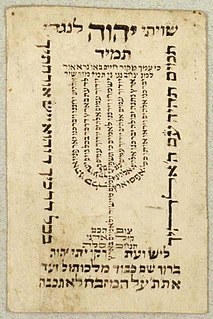History
In the Tudor and early Stuart periods, services were described as "Short", "Great" or "Verse" services:
- Verse services incorporated sections for solo voices.
- Short services were simple settings for four-part choir which could be sung a cappella.
- Great Services (of which the most famous is the Great Service by William Byrd) were long and elaborate and presumably kept for special occasions.
Following the Restoration this classification gradually broke down and services became known by the key in which they were written; hence the common shorthand terminology "Purcell in G minor" or "Stanford in B flat".
From the twentieth century, compositions are often named after the college chapel or cathedral for which they were written: examples are the Collegium Magdalenae Oxoniense of Kenneth Leighton for Magdalen College, Oxford and the Gloucester Service of Herbert Howells for Gloucester Cathedral.

A Requiem or Requiem Mass, also known as Mass for the dead or Mass of the dead, is a Mass in the Catholic Church offered for the repose of the soul or souls of one or more deceased persons, using a particular form of the Roman Missal. It is usually, but not necessarily, celebrated in the context of a funeral.

In the practice of Christianity, canonical hours mark the divisions of the day in terms of periods of fixed prayer at regular intervals. A book of hours normally contains a version of, or selection from, such prayers.
"I was glad" is a choral introit which is a popular piece in the musical repertoire of the Anglican church. It is traditionally sung in the Church of England as an anthem at the Coronation of the British monarch.

Tenebrae is a religious service of Western Christianity held during the three days preceding Easter, and characterized by gradual extinguishing of candles, and by a "strepitus" or "loud noise" taking place in total darkness near the end of the service.
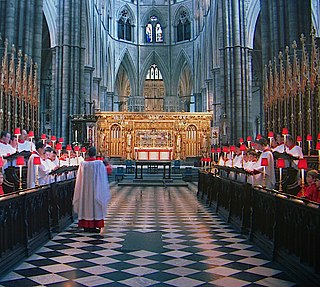
Evening Prayer is a liturgy in use in the Anglican tradition celebrated in the late afternoon or evening. It is also commonly known as Evensong, especially when the office is rendered chorally, that is, when most of the service is sung.
John Marbeck, Merbeck or Merbecke was an English theological writer and musician who produced a standard setting of the Anglican liturgy. He is also known today for his setting of the Mass, Missa Per arma justitiae.
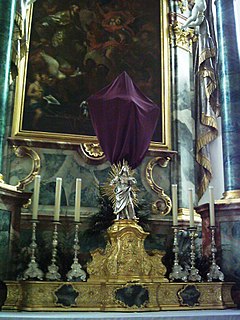
Passiontide is a name for the last two weeks of Lent, beginning on the Fifth Sunday of Lent, long celebrated as Passion Sunday, and ending on Holy Saturday.

Morning Prayer, is one of the two main Daily Offices in Anglican churches, prescribed in the various editions of the Book of Common Prayer and other Anglican liturgical texts. Like Evening Prayer, it may be led by a layperson and is recited by some Anglicans daily in private.
Robert Parsons was an English composer of the Tudor period who was active during the reigns of King Edward VI, Queen Mary I and Queen Elizabeth I. He is noted for his compositions of church music.

Psalm 93 is the 93rd psalm of the Book of Psalms, generally known in English by its first verse, in the King James Version, "The Lord reigneth, he is clothed with majesty". The Book of Psalms is part of the Hebrew Bible and the Christian Old Testament. It is Psalm 92 in the slightly different numbering system of the Greek Septuagint and Latin Vulgate versions of the Bible. Its Latin title is Dominus regnavit, decorem indutus est. It is the first of a series of psalms which are called royal psalms as they praise God as King.

Psalm 134 is the 134th psalm from the Book of Psalms, generally known in English by its first verse in the King James Version, "Behold, bless ye the LORD, all ye servants of the LORD". The Book of Psalms is part of the Hebrew Bible and the Christian Old Testament. It is Psalm 133 in the slightly different numbering system of the Greek Septuagint and Latin Vulgate versions of the Bible. Its Latin title is "Ecce nunc benedicite Dominum". It is the last of the fifteen Songs of Ascents, and one of the three Songs of Ascents consisting of only three verses.

Psalm 133 is the 133rd psalm of the Book of Psalms, generally known in English by its first verse, in the King James Version, "Behold, how good and how pleasant it is for brethren to dwell together in unity!" In the Greek Septuagint version of the bible, and in its Latin translation in the Vulgate, this psalm is Psalm 132 in a slightly different numbering system. In Latin, it is known as "Ecce quam bonum". The psalm is one of the fifteen Songs of Ascents, and one of the three Songs of Ascents consisting of only three verses.

Psalm 121 is the 121st psalm from the Book of Psalms. It is one of 15 psalms categorized as "A song of ascents", although unlike the others, it begins, Shir LaMa'alot.
Order of Mass is an outline of a Mass celebration, describing how and in what order liturgical texts and rituals are employed to constitute a Mass.

The Mass for Four Voices is a choral Mass setting by the English composer William Byrd (c.1540–1623). It was written around 1592-3 during the reign of Queen Elizabeth I, and is one of three settings of the Mass Ordinary which he published in London in the early 1590s.
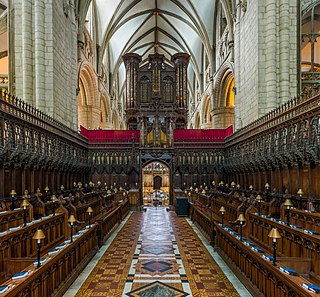
Magnificat and Nunc dimittis for Gloucester Cathedral, also known as the Gloucester Service, is a setting by the English composer Herbert Howells of the Magnificat and Nunc dimittis for the Anglican service of Evening Prayer. Scored for four-part choir and organ, it was written in 1946 for Gloucester Cathedral. It was published by Novello in 1947.

Magnificat and Nunc dimittis in D is a choral setting by the Irish composer Charles Wood of the Magnificat and Nunc dimittis for the Anglican service of Evening Prayer. Scored for four-part choir and organ, it was written in 1898. It is also known as Evening Service in D major.

